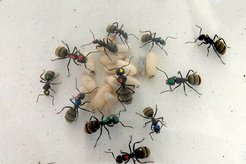‘Frame of Mind’ and division of labor of social insects
Social insect colonies are highly organized communities, and even though they may appear strikingly similar, they are all but the same. Individuals differ in the way they respond to external stimuli and they differ in the tasks they perform. These inter-individual differences in behavior reflect differences in how sensory information is processed and evaluated, and this in turn is often highly biased by the internal, physiological state of the individual. Activity such as foraging or defense but also hunger and other stress factors determine the physiological state and impact how the brain processes information, i.e. setting the “frame of mind”. Division of labor in a social environment is based on communication among colony members, recent experience and the frame of mind of individuals.

We study how the social environment impacts the physiological state of individuals, setting the frame of mind and ultimately leading to task allocation and division of labor within the colony. In our experiments, we describe neuromodulatory systems (serotonin, dopamine etc.) which then allows us to relate the individual behavior to the chemical signature of a physiological state. Our aim is to understand the neural principles that enable context-dependent decision making and behavior in a social environment; and to elucidate how the diversity of individuals within a colony is coordinated for division of labor to emerge while still maintaining colony cohesion.
We are seeking a PhD student to join the Behavioral Neurobiology group (https://www.biologie.uni-konstanz.de/en/kleineidam) at the Biology department of the University of Konstanz. We expect the student to develop his/her own research project, addressing questions that lead to a better understanding of the underlying neural mechanisms of individual behavior and its consequences on social organization and collective behavior in social insects. Access to the central facilities of the department (bioimaging center, genomics center, proteomics center, electron microscopy) and equipment for electrophysiology, optical imaging, multiphoton microscopy, behavioral setups, gas chromatography and animal care facility is given.
The position is fully funded for 3 years, includes some teaching obligations and is open to students of any nationality.
